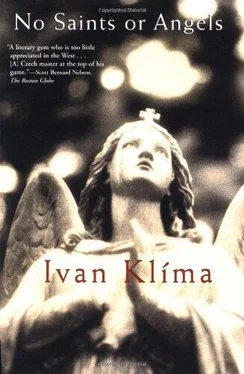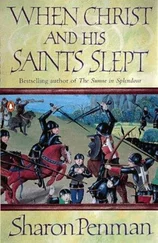I'd never want to act the policeman with her, the way my father did with me. It wouldn't be any use anyway. When they want to keep someone under surveillance, a squad of policemen are often not enough. What am I to tell her? How am I to convince her to change her ways? What did I neglect? Didn't I give her enough love, or, on the contrary, was I too kind?
After all, we got on well together. Often we'd be left on our own together, even before we were abandoned for good. Her father would be off at some tennis tournament — or at least so he said — and we would play with the Barbie dolls. We actually had three of them: one white, one black and one with almond eyes. And I used to tell a long story in episodes about a princess who was clever and brave. She could slay dragons that had defeated namby-pamby princes and outwit anyone who tried to deceive her. She
loved travel, climbing up hill and down dale, and she had a tame killer whale who carried her on its back through the warm seas.
And whenever my little girl was ill, I would always wake up a few seconds before she awoke and started to demand my assistance or at least my presence.
Then we were left to ourselves, and every summer I would stubbornly take her to the seaside. "We didn't catch sight of any killer whales, but spent our time in needlessly expensive hotels. I was equally stubborn about sending her to the mountains every winter. She had the very best in skis, boots and bindings. In that way I spoiled her and went without things myself so that she shouldn't have the feeling that she was denied something just because I wasn't able to hold on to her father. It's not long since we used to spend nice evenings together. We'd sit together in my room because it has the most space and play guitar and sing spirituals or songs from my younger days.
I lean over her and stroke her hair. The little-girl woman sighs and out of her sleep she brushes away my hand as if brushing away a midge.
I go back into my own room. The box with Dad's writings is still standing by the wardrobe.
Lucie once confided to me that whenever she picks up an encyclopaedia or book on photographers, she first looks to see if there's a mention of her. I don't look for myself in encyclopaedias. People need a dentist to repair their teeth, they don't need to idolize or read about them. But I'll check, at least, how my own father welcomed me into the world and how he spoke about me.
Before I reach that illustrious day, I have to wade through the Great Events of those times. I pause for a moment at one of the most spectacular show trials, in which the revolutionaries were true to their predecessors and started to murder each other. Our own comrades betrayed us! It's not surprising that almost all of them were foreigners, Zionists, Jews in other words. That's how they repay our people's trust in them!
I wonder what he told Mum. And I wonder what Mum thought about it and whether she dared say anything out loud. Maybe her mind was more on me, who was already in her tummy by then. What idea could she have had of the world I would be born into?
I go on leafing through the exercise book. Yes, of course, here's the well-retouched face of the Generalissimo staring at me out of the page, framed in black. No pockmarks, but no kindly smile either: it wouldn't be appropriate at a moment made for mourning. Just below it a brief note. I convened a special remembrance meeting in the assembly shop. I said: One of the greatest geniuses of mankind is dead, a thinker, philosopher, military leader, revolutionary, saviour of our lives and liberator of our peoples, a man whose heart held enough love for all people. A giant acclaimed by poets the world over. I stressed that we would remain true to his legacy. At one moment I was overcome with emotion and couldn't continue my oration. I noticed that the people listening were moved too and the women were crying. Comrade V-ová came to see me after the meeting and was sobbing. Then she said: I thought he'd never die, that the Soviet doctors wouldn't let him die. I told her: Even he was mortal, but his achievements will last for ever.
My father, a fool. At least he didn't make grammatical mistakes. He had no education, but he was a pedant. No mention of me, of course. I turn the page. A mention at last: I have a daughter. I haven't seen her yet. The comrades suggested a celebration, but I refused. How could I celebrate at a moment when the entire progressive world is in mourning. It would be a human and a political mistake. I simply made a political mistake. It's not the done thing to come into the world at a moment when the vassals are groaning in pain at the loss of a tyrant.
Today's paper reports that the Soviet Union has the H-bomb too. Great news for all fighters for world peace!
I close the exercise book in disgust.
When I mentioned to the young man who invited me for a glass of wine the other day that I was born on the day of the
Soviet dictator's death, he declared almost triumphantly that it was a fateful coincidence. Fateful coincidence with what? — I didn't ask him.
I now know that he's called Jan Myšák. His pals mostly call him Myšák or Mickey Mouse. He strikes me as shy and a bit childish. He probably has a hang-up about not completing his studies. I expect that's why he stressed more than once how important his job is. Apparently he's not allowed to say much about it because it has to do with uncovering those who collaborated with the State Security during the previous regime.
He tried to tell me at breakneck speed all the main things about himself. He lives with his mum but claims that he refuses her attentions. I expect he's only kidding himself; he referred to her several times in passing: 'my mother thinks. . my mother says. . my mother doesn't like. .'
He also told me he regularly takes part in some kind of complicated parlour games, in which people play historical or imaginary characters: kings, jesters and so on, but also monsters, elves or aliens. As if he was ashamed about still playing games, he explained that he took part in them in order to forget what he encountered every day when reading the reports of police informers.
Then he talked about my ex-husband, who was apparently the one who aroused his interest in history, and why he started to study it at university.
I don't have much interest in history. Descriptions of battles and famous victories horrified me. I used to imagine the soldiers who were left lying dead on foreign fields and the anticipation of those they left behind. Women watching out for men who could never return, children who grew up without hearing a man's voice.
Soldiers mostly didn't have children yet, he pointed out. They used to recruit single men.
Even so, someone was waiting for those who were butchered, I said. And in the most recent major wars they recruited everyone whether they were twenty or fifty. When my beloved Karel Čapek
wrote The Mother before the last world war, he tried to see history through a woman's eyes. In the end he was unsuccessful, because he had her send her fifth and last surviving son to the war. That's something I'd never do. I told Jan I'd refuse to accept the laws of a man's world that demand bloodshed and tears.
He said he understood me and admitted that the world of men is essentially cruel. He couldn't imagine a woman devoting herself to wiping out entire nations, races or social classes as the dictators over the last century had done. Then he started to talk about revolutions, not omitting one of my one and only husband's lessons about the tyrants who changed the fate of Russia and set about changing the fate of the world.
He spoke with passion, but I couldn't concentrate on what he was saying: I was taken by his eyes. It's unusual to find a redhead with large, dark eyes. I don't ever recall loving anyone with eyes like that. I used to be attracted by blue or slate-grey eyes, like my first and only husbands, although his gaze was cold. But that young fellow looked at me almost imploringly.
Читать дальше












